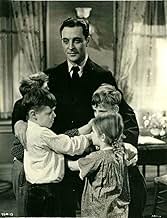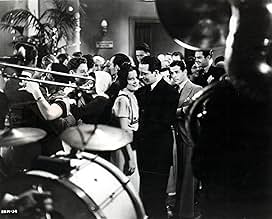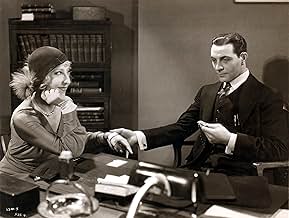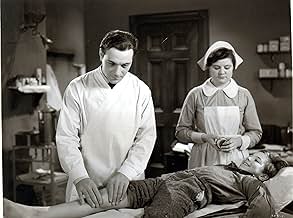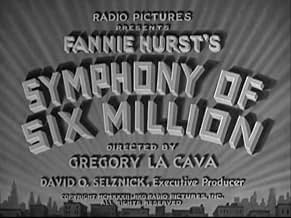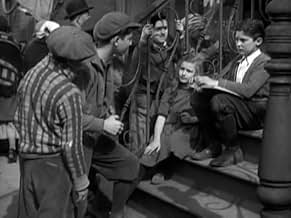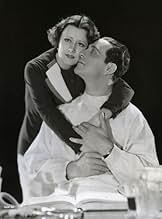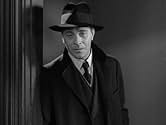IMDb RATING
6.1/10
476
YOUR RATING
A boy grows up to become a successful doctor at the expense of family relationships.A boy grows up to become a successful doctor at the expense of family relationships.A boy grows up to become a successful doctor at the expense of family relationships.
- Awards
- 2 wins total
Maurice Black
- Felix's Patient
- (uncredited)
Jesse De Vorska
- Mr. Horowitz - Hospital Patient
- (uncredited)
Harold Goodwin
- Intern at Hospital
- (uncredited)
Dorothy Gray
- Jessica - as a Girl
- (uncredited)
Julia Griffith
- Guest at Redemption Ceremony
- (uncredited)
Harry Holman
- Mr. Holman - Hospital Patient
- (uncredited)
Featured reviews
The story is nice, the theme pleasant (money isn't everything), but the outstanding element is the Jewish working-class background of a non-orthodox family. Not claustrophobic like the Jazz Singer and other self-pitying films, this film has an open and sunny attitude that makes it very accessible. Excellent, warm portrayals by Gregory Ratoff and Anna Appel as the stereotypical parents.
I was intrigued with the title of Six Million having a Jewish theme and what the connection would be since the movie was made in 1932. Once watching I was riveted to the story. The actors were custom made for their parts, hearing Oyfn Pripinchik being played throughout the movie made it heartwarming and endearing. A real Yiddishe Mama, an old fashioned papa (fabric cutter) and their children all living on the Lower East Side. The theme was that one of their son's wanted to be a doctor and took up a practice in their neighborhood caring for the poor (sometimes accepting no payment or very little) because it was rewarding for him. His brother saw it as wasting his talents and wanted him to become a Park Avenue big shot to make money. He did and lost his spirit. But wait til the middle and the end to see what happens. Have a box of tissues around. You will need it. Typical Fanny Hurst style.
A previous viewer commented that there isn't anything "Pre-Code" about "Symphony of Six Million." Ohhhh, yes there is - the frank and loving embrace of Jews and Jewishness, especially the familial bonds of aspiration, hope and love so strong and heart-rending that conflict and guilt are its inevitable by-products.
Such an overtly Jewish photo play wouldn't have been acceptable in the Hollywood of just a few years later. No one would come right out and say so, but the likely reason was the sensibilities of the newly militant Catholic audience, then being stirred up by the likes of Father Charles Coughlin's anti-Semitic radio talks. Also to be catered to were the quieter prejudices of Middle Western Protestants, for whom Will Hays stood in as proxy on the Code committee.
The story being pretty boilerplate, the charm of this film is all in the atmosphere, which is laid on pretty thickly. Crucial to this are able supporting players, especially Gregory Ratoff and Anna Appel as Papa and Mama Klauber. Ricardo Cortez is a bit stiff as the conflicted, noble Felix, but his swarthy, polished earnestness hits just the right note for the well-to-do My-Son-The-Park-Avenue-Doctor, 1932 edition. Irene Dunne as Jessica, Felix's crippled love interest, is lovable mostly for being Irene Dunne, whose refined features and diction don't gibe at all with her role as a ghetto girl. It says a lot about the men who once ran the movies that an obviously Jewish romantic female lead was something they couldn't, or wouldn't, portray. Authentic Jewish womanhood was still inseparable from the family matriarch, played with affecting melodrama by Appel.
TCM's Robert Osborne pointed out that "Symphony" was one of the first talkies with a full original score. At David Selznick's behest, Max Steiner wrote nearly continuous music for the film. It's heavy going at times: Felix's inner drama is too often greeted by heroic heralds of brass, and the lugubrious harmonic-minor strings accompanying Irene Dunne's entrances are like a nice glass Schmalz poured over a sumptuous Sunday chicken dinner.
Such an overtly Jewish photo play wouldn't have been acceptable in the Hollywood of just a few years later. No one would come right out and say so, but the likely reason was the sensibilities of the newly militant Catholic audience, then being stirred up by the likes of Father Charles Coughlin's anti-Semitic radio talks. Also to be catered to were the quieter prejudices of Middle Western Protestants, for whom Will Hays stood in as proxy on the Code committee.
The story being pretty boilerplate, the charm of this film is all in the atmosphere, which is laid on pretty thickly. Crucial to this are able supporting players, especially Gregory Ratoff and Anna Appel as Papa and Mama Klauber. Ricardo Cortez is a bit stiff as the conflicted, noble Felix, but his swarthy, polished earnestness hits just the right note for the well-to-do My-Son-The-Park-Avenue-Doctor, 1932 edition. Irene Dunne as Jessica, Felix's crippled love interest, is lovable mostly for being Irene Dunne, whose refined features and diction don't gibe at all with her role as a ghetto girl. It says a lot about the men who once ran the movies that an obviously Jewish romantic female lead was something they couldn't, or wouldn't, portray. Authentic Jewish womanhood was still inseparable from the family matriarch, played with affecting melodrama by Appel.
TCM's Robert Osborne pointed out that "Symphony" was one of the first talkies with a full original score. At David Selznick's behest, Max Steiner wrote nearly continuous music for the film. It's heavy going at times: Felix's inner drama is too often greeted by heroic heralds of brass, and the lugubrious harmonic-minor strings accompanying Irene Dunne's entrances are like a nice glass Schmalz poured over a sumptuous Sunday chicken dinner.
If I were picking a list of films for a Jewish film festival, Symphony Of Six Million would be right at the top of my list. Gregory LaCava directed it and with a rather florid style that probably would not go over with today's audience. Still it is quite a picture of the Jewish experience in America during the Depression years.
Ricardo Cortez stars here as an idealistic young kid who seeing the disease and poverty around him in the Lower East Side neighborhood he comes from works and studies hard to become a doctor. Cortez indeed becomes a doctor and opens a clinic in the old neighborhood.
But as his family sees it, he's too good for that. His brother Noel Madison persuades him to move uptown and start gathering a rich patient list in order that the entire family can move out and their parents Anna Appel and Gregory Ratoff can now take it easy.
Soon enough though Cortez forgets why he became a doctor with all the acclaim he now receives and the big money he commands. In the end he faces crises involving the health of two loved ones. He fails one and saves the other and possibly saves his soul as well.
One thing LaCava did was capture the Lower East Side of New York Jewish neighborhood. Appel and Ratoff were both veterans of the Yiddish theater and they really carry their parts off well. Cortez was also Jewish in real life, real name Jacob Kranz. He only got that name because he got his start playing Rudolph Valentino knockoff parts on the silent screen.
Irene Dunne is Cortez's co-star and she has little to do here as the girl who loves him since childhood. The film totally focuses around Cortez and his family dynamic.
Too melodramatic for today's audience, still Symphony For Six Million is a great picture of Jewish life in America in the not too distant past.
Ricardo Cortez stars here as an idealistic young kid who seeing the disease and poverty around him in the Lower East Side neighborhood he comes from works and studies hard to become a doctor. Cortez indeed becomes a doctor and opens a clinic in the old neighborhood.
But as his family sees it, he's too good for that. His brother Noel Madison persuades him to move uptown and start gathering a rich patient list in order that the entire family can move out and their parents Anna Appel and Gregory Ratoff can now take it easy.
Soon enough though Cortez forgets why he became a doctor with all the acclaim he now receives and the big money he commands. In the end he faces crises involving the health of two loved ones. He fails one and saves the other and possibly saves his soul as well.
One thing LaCava did was capture the Lower East Side of New York Jewish neighborhood. Appel and Ratoff were both veterans of the Yiddish theater and they really carry their parts off well. Cortez was also Jewish in real life, real name Jacob Kranz. He only got that name because he got his start playing Rudolph Valentino knockoff parts on the silent screen.
Irene Dunne is Cortez's co-star and she has little to do here as the girl who loves him since childhood. The film totally focuses around Cortez and his family dynamic.
Too melodramatic for today's audience, still Symphony For Six Million is a great picture of Jewish life in America in the not too distant past.
Several people posting reviews for "Symphony of Six Million" have made some terrific points. One is that the title of this film, about Jews in New York, eerily suggests the Holocaust - well, that's why I watched it, in fact. I didn't read the description too clearly, saw the word Jewish, and I thought it was about Jews in Germany escaping to New York. The second comment was that it is a depiction of a Jewish family that several years later would not have been done in Hollywood for various reasons.
"Symphony of Six Million" stars Ricardo Cortez, Gregory Ratoff and Irene Dunne. It's the story of a young Jewish boy, Felix Klauber (Cortez) who grows up in the ghetto wanting to be a doctor who helps the people there. All is well until he is pressured by his brother Magnus (Noel Madison) to help the family get out of the ghetto so his father doesn't have to work so hard, his sister can marry well, etc., none of which he can do working for the poor. So Felix gives up his dream and moves to the upper West Side and then to Park Avenue, becoming more and more unhappy. Then there is a tragedy, and Felix is forced to re-look at his life.
The Fannie Hurst story is dated, melodramatic and is filled with stereotypical dialogue such as "you want I should" with a sing-songy voice throughout. Yet it shows the life of an immigrant in the ghetto that moves up and manages to hold interest, mainly because the family exhibits warmth, love, humor and charm. Gregory Ratoff is terrific as Mr. Klauber. Cortez, always an affable actor, has some of the heaviest dialogue, so at times his acting seems overdone. Noel Madison as Felix's brother has the right energy for his role and is a little reminiscent of the actor Phil Casnoff. As others have pointed out, Irene Dunne isn't low-class enough as Felix's crippled girlfriend, and one wonders throughout why she and Felix didn't get married. She is so pretty as a brunette, however, and has a lovely quality.
This is the first fully-orchestrated talkie, and the music is completely distracting with its weeping violin sounds. The other distracting thing is that characters speak off camera and it sounds as if the actors are being fed lines by a director's assistant - the sound has no presence at all as it isn't miked.
What makes this film especially dated is the idea of someone becoming a doctor to work in a clinic and help people and not care about money. This may have been the America of 1932; it sure isn't now. Well worth seeing.
"Symphony of Six Million" stars Ricardo Cortez, Gregory Ratoff and Irene Dunne. It's the story of a young Jewish boy, Felix Klauber (Cortez) who grows up in the ghetto wanting to be a doctor who helps the people there. All is well until he is pressured by his brother Magnus (Noel Madison) to help the family get out of the ghetto so his father doesn't have to work so hard, his sister can marry well, etc., none of which he can do working for the poor. So Felix gives up his dream and moves to the upper West Side and then to Park Avenue, becoming more and more unhappy. Then there is a tragedy, and Felix is forced to re-look at his life.
The Fannie Hurst story is dated, melodramatic and is filled with stereotypical dialogue such as "you want I should" with a sing-songy voice throughout. Yet it shows the life of an immigrant in the ghetto that moves up and manages to hold interest, mainly because the family exhibits warmth, love, humor and charm. Gregory Ratoff is terrific as Mr. Klauber. Cortez, always an affable actor, has some of the heaviest dialogue, so at times his acting seems overdone. Noel Madison as Felix's brother has the right energy for his role and is a little reminiscent of the actor Phil Casnoff. As others have pointed out, Irene Dunne isn't low-class enough as Felix's crippled girlfriend, and one wonders throughout why she and Felix didn't get married. She is so pretty as a brunette, however, and has a lovely quality.
This is the first fully-orchestrated talkie, and the music is completely distracting with its weeping violin sounds. The other distracting thing is that characters speak off camera and it sounds as if the actors are being fed lines by a director's assistant - the sound has no presence at all as it isn't miked.
What makes this film especially dated is the idea of someone becoming a doctor to work in a clinic and help people and not care about money. This may have been the America of 1932; it sure isn't now. Well worth seeing.
Did you know
- TriviaAfter David O. Selznick became RKO's head of production in late 1931, he put the melodrama L'âme du ghetto (1932) (originally titled "Night Bell" after the Fannie Hurst story it is based on) into production, overseen by Pandro S. Berman. Selznick insisted that the original screenplay be rewritten to reclaim the ethnic touches from Hurst's story. Selznick likely wanted the film to serve as a mirror on to Jewish life, both of immigrants and their assimilated children. He himself changed the name of the film (a reference to New York City's population) as it was "more dramatic and dignified" than Night Bell. He also directed RKO music department chief Max Steiner to use symphonic music for the score and to have music throughout the picture. This was innovative as "talkies" rarely had an extensive score.
- GoofsAs is often the case when showing a devout Jewish home, a menorah, the traditional candelabrum, is displayed. However, this is used only once a year, so for the rest of the year it is put away. Having it on show is like having a Christmas tree up all year round to show that the family are Christians.
- Quotes
Dr. Schifflen: My boy, there are two kinds of men in our profession. Some are gifted with the spark of genius; some of us are... just doctors.
[walks to the door and opens it, then turns back toward Felix]
Dr. Schifflen: Felix Klauber, you're more capable than I, but if you don't go through with this operation, I will.
- ConnectionsFeatured in David O. Selznick: 'Your New Producer' (1935)
Details
- Release date
- Country of origin
- Languages
- Also known as
- Symphony of Six Million
- Filming locations
- Coney Island, Brooklyn, New York City, New York, USA(amusement park)
- Production company
- See more company credits at IMDbPro
Box office
- Budget
- $270,000 (estimated)
- Runtime
- 1h 34m(94 min)
- Color
- Aspect ratio
- 1.37 : 1
Contribute to this page
Suggest an edit or add missing content

